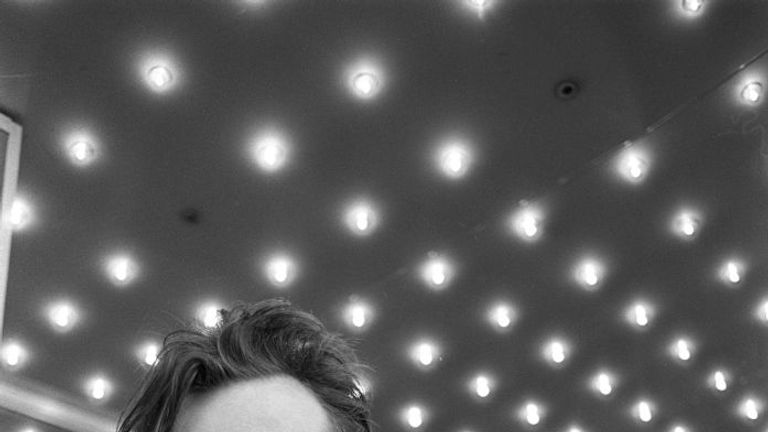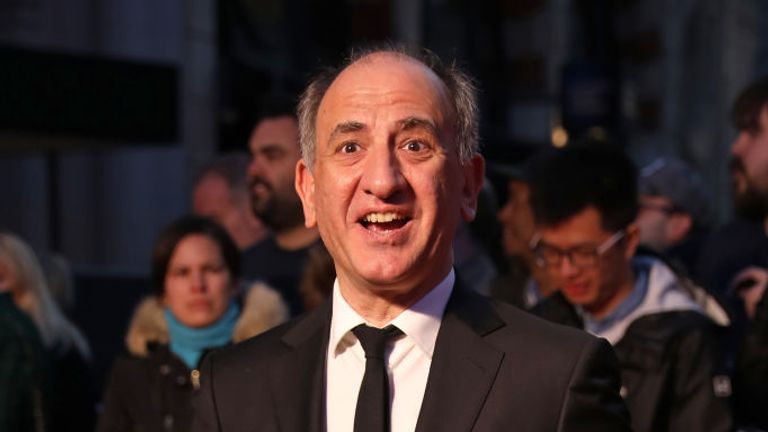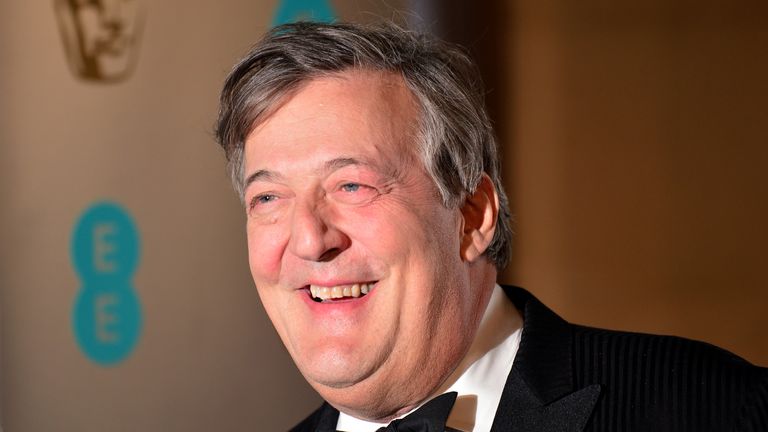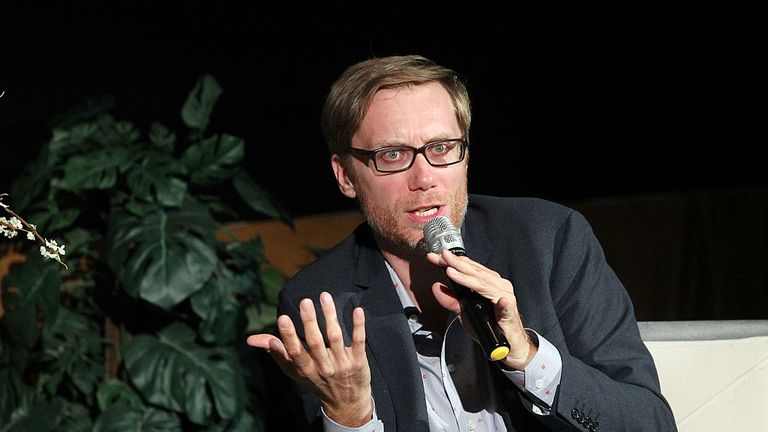Richard Herring says it's lucky he didn't create Alan Partridge, as the success would have stopped him in his tracks.
The 52-year-old comedian rose to fame as one half of double-act Lee and Herring alongside Stewart Lee, but has since gone solo.
He tells Sky News it's a status he hasn't always been comfortable with: "I wasn't a natural solo stand up. The comedy I've always liked is the dynamic between two or more people".
His relationship with Lee is one he frequently refers to in his stand up, and in his immensely popular Richard Herring's Leicester Square Theatre Podcast (known simply as RHLSTP to fans).
Despite his preference for working with others, he admits it wasn't always easy.
"It's very rare that a double act haven't fallen out or haven't got some kind of issue. It's a very complicated relationship between two people and I think with me and Stu it became easier once we weren't really working together.
"Early on I had to address it - I came back to stand up and was working my way up, just as Stewart suddenly emerged as the most successful stand up in the country.
"People were constantly comparing us, saying 'Oh, Rich Herring's clearly influenced by Stewart Lee. Obviously, we pretty much influenced each other - we worked together for a decade.
"That was something I think needs to be addressed, so I would address that in the stand-up shows."
The duo worked together for eight years, before calling it a day.
Herring goes on to describe the "feeling of both love and then just 'not love'" between them.
Before achieving fame in front of camera, they worked together on spoof current affairs radio show On The Hour - the birthplace of Alan Partridge.
There has previously been debate over the amount of credit due to those who worked on the show's characters.
Herring explains: "We were a third of the writing team and so we wrote most of his [Partridge's] early material, but it's very much Steve Coogan's creation really, and Armando [Scottish satirist Armando Iannucci] as well, but it's Steve who came up with the character and the characterisation.
"Beyond that we were going to write for The Day Today, but they wouldn't give us any ownership of the characters that we felt we had informed or co-created.
"It was confusing because it was a very improvised show."
One character Herring came up with single-handedly was bad-tempered economic correspondent Peter O'Hanraha-hanrahan (played on the show by Patrick Marber).
His inspiration was hearing an ill-informed reporter on the radio.
The resulting skit about the Maastricht Treaty, where the character clearly hasn't read the thing he's meant to be talking about, made the highlights of Pick Of The Week.
However, the clip was credited only to Iannucci and Marber.
Herring wasn't too pleased: "I said, 'But it was my idea' and Armando said, 'No, you just heard it on the radio'. But that's essentially what On The Hour was.
"No one was deliberately trying to do each other over, and we were all just working on trying to get it going, but that's where it became kind of complex because obviously you do inform a character by writing for them."
He says it became a running joke.
"I think we started when Patrick Marber said, 'I expect Lee and Herring claim they came up with Alan Partridge' - which we'd never really done - and then from that point on we decided to always say we'd created Alan Partridge, just as a joke.
"It would have been nice if we'd got one percent of Alan Partridge, which wouldn't have been much to get at the time
"It's been good to have to struggle without getting regular massive cheques.
"Stuart and I became pretty successful pretty young and I think if the Lee and Herring stuff had become as successful as Little Britain - which it wasn't far from at one point - I think it would have destroyed both of us.
"We just had a fairly steady progression that was going up and up and up and then we had this kind of disappointment of the rug being pulled away from us."
Fist of Fun and This Morning With Richard Not Judy both ran for two series each in the latter half of the 1990s, but neither went on to a third.
The pair split at the end of the 90s, with Lee then stepping back from stand up in the early 2000s to write Jerry Springer - The Opera.
Herring explains: "I think it was the making of both of us really and I think it was probably good for both of us to also have a reason not to work with each other anymore as well.
"If your first thing is hugely successful then it's really difficult to carry on, because everyone's always comparing your stuff to that first thing you did and you're never quite as good.
"I think not having created Alan Partridge is probably quite lucky."
It was after taking a break from stand up himself that Herring got drawn into the world of podcasts.
The dynamic of a face-to-face interview on stage, in front of a live audience, could be seen as creative way to relive his double-act past.
"I'm not really in the showbiz party stuff. I don't have celebrity friends - a few other comedians are buddies, but I'm not massively close to many of them.
"So to be able to do that [create a rapport] with someone brand new and hopefully make that spark work is quite a challenge."
Initially financed by a Kickstarter campaign, the RHLSTP podcast has gone on to win a legion of fans, but it turns out he never intended it to become his main job.
Herring admits he first ventured into the world of podcasts "as a ploy to get back on the radio", but RHLSTP has now been broadcasting for over seven years.
He jokes: "No one's been sued for a podcast yet, I've got away with a lot.
"What appealed to me was the autonomy of it really and just at a time when the BBC was clamping down on everything that was potentially offensive, partly because of the Jonathan Ross and Russell Brand incident."
In 2008, Ross and Brand both left their jobs at BBC Radio 2 after leaving a series of prank calls on the voicemail of actor Andrew Sachs.
There was an inevitable clampdown on any risky comedy themes following the scandal.
Herring goes on: "I was coming out with loads of ideas and it was just painful to try and get them by traditional broadcasters. It appealed to me that you could make something and get it out right away."
He was also attracted to the more relaxed format of a podcast.
"No one was doing long-form interviews, and having been interviewed a lot myself, I know you can't get into anything complex.
"My audience are nice, they listen and get the jokes but they're also prepared to listen to serious business.
"The Stephen Fry episode was an early example of that, when the atmosphere in the room was so electric and amazing and the love was so obvious. I think that's why Stephen decided to open up to us."
During the podcast, Fry was asked a question written by Welsh schoolboy Ben Evans: "What is it like being Stephen Fry?"
In his answer, Fry talked about his experience of depression, and revealed a recent suicide attempt that went on to make headlines around the world.
Despite being described by The Guardian as on his way to "becoming the best celebrity interviewer in the land", Herring is remarkably laid-back in his interview approach.
Frequently describing his preparation as "disorganised" and calling himself "reasonably good", he insists he's "not trying to get anything out of people".
Herring goes on: "If people are willing to want to volunteer something, I will obviously allow that. But I'm very protective of the guests.
"I often edit stuff out if I feel the guest has come out too badly or they might be misunderstood."
It's a credit to how comfortable his guests feel that they sometimes say a little too much.
"People suddenly do open up and sometimes say things that they shouldn't about something they're doing or mention someone they shouldn't have talked about."
One of Herring's podcast aids, by his side throughout each interview, is his infamous "Book of Emergency Questions".
A collection of silly, surreal, often downright rude questions, originally noted down in case his mind went blank, he has now published three volumes.
"The emergency questions work because they're weird and because entertainers want to entertain. If you ask them something they haven't been asked before, they will try and come up with a good story for you and you'll get something new.
"Also, having accessed that part of their brain where they're trying to dredge up a memory or be imaginative and come up with something funny, then the rest of the interview will go in a different way.
"Interviewers are generally more interested in your successes, so I deliberately concentrate more on the stuff that didn't work or was much more obscure."
Playing "a naughty version" of himself, his favourite interviews are the ones with the "big laughs" - including Greg Davies and Bob Mortimer.
"It's a risky thing and I'm a little bit cheeky with people. I hope the guests all know that if I'm rude to them, it's a joke. They usually do."
But has he ever got it wrong?
Herring takes just a moment to consider: "Stephen Merchant is the famous one…"
During his podcast chat with Merchant, Herring introduces him as "a definite paedophile", before going on to tease him about Extras.
Herring explains: "I did misjudge the point where he became actually offended.
"We'd been doing half an hour of real proper banter and I just assumed for a while that he was joining in, and then suddenly I realised…
"I think he'd slightly misunderstood a point I was making in a joke. I hate if the guest comes off and doesn't feel happy and he was a little bit unhappy at the end.
"Those sort of things haunt me for weeks. I can't sleep for days if I ever feel like I'm actually upset someone."
:: Listen to the Backstage podcast on Apple Podcasts, Google Podcasts, Spotify, Spreaker
He also says the first time he chatted to David Mitchell his interviewing style was "a little overbearing".
"I listened back and felt quite embarrassed by that one in hindsight."
Ironically, it's the times the interviews go off-piste that his fans love the most.
"I've got better at not [upsetting people], although I think the audience enjoy the ones where I dig myself into a hole."
With new guests lined up for his run of tours in theatres around the country, it's a hole Herring hopes he'll not be falling into again soon.
He thinks for a moment: "Having done it so much, I think there's an understanding of where the line is…
"At lease, it feels like a long time since I've come off stage and felt mortified by some error I've made."
RHLSTP is touring until April 2020.
Entertainment - Latest - Google News
November 02, 2019 at 11:49AM
https://ift.tt/2NB5sYP
Richard Herring: 'It's lucky I didn't create Alan Partridge' - Sky News
Entertainment - Latest - Google News
https://ift.tt/2AM12Zq
Bagikan Berita Ini




















0 Response to "Richard Herring: 'It's lucky I didn't create Alan Partridge' - Sky News"
Post a Comment